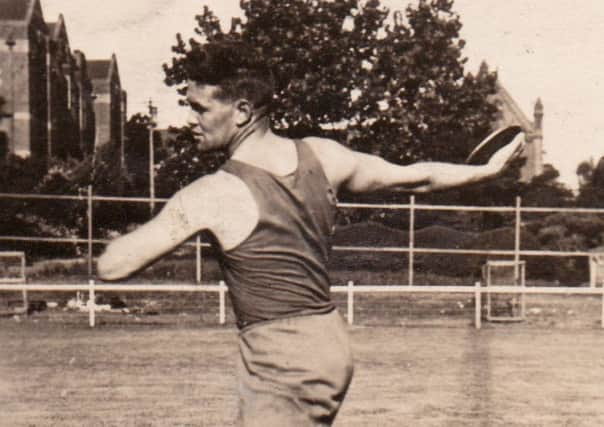Scottish discus legend and the tragedies that held him back


Only a single athletics medal was secured, a silver, and that from an unlikely source in an unlikely event. It was won by a 24-year-old Glasgow police officer, David Young, in the discus throw, an event in which Scotland had no pedigree. And despite Young having won the Scottish title and been selected for Great Britain in the event the year before, he himself was relatively unknown. The discus final takes place on Friday and it is fitting to recall his feat and pay tribute to him.
After the Games, he threw 146ft in a competition in Hobart, a distance which would have won him the gold medal by a foot. But even better was to come once back home when he won the Scottish title at Hampden Park with a magnificent throw of over 153ft, a new Scottish, British, British Empire and all-comers record, which would have won gold in Sydney by about 8ft and would stand as a British record for over 12 years.
Advertisement
Hide AdAdvertisement
Hide AdHad it not been for the advent of war and tragedy in his personal life, there is little doubt Young would have made his mark on the European and Olympic stage. Circumstances cruelly robbed him of his peak years and he never again rose to the heights of 1938.
Born in Shotts, he joined Glasgow Police in 1934, stationed in Shettleston where he joined the local Harriers club. At this time in Britain the approach to technical events like the discus was rudimentary. Coaching was virtually non existent, knowledge of technique very limited and facilities extremely basic.
The myriad aids to performance enjoyed by today’s athletes were conspicuously absent. By contrast, Young was self coached and learned by trial and error.
Kenny Milne, a neighbour of Young’s, remembered him doing a primitive form of weight training, “My family had a coal merchant’s business with a yard at Old Shettleston Road. With him being in the police there, we had a lot of contact and my father used to allow him to train in the yard. He used to come in regularly and train with bags of coal, doing a variety of exercises with them, lifting them and swinging them round his head. He would choose an empty sack, put some coal in to do an exercise and then gradually add more coal to increase the weight. He was in there for about a couple of hours a time at least once a week.
“He was very modest about his achievements. We didn’t know till after he returned from Sydney in 1938 that he had won a silver medal. There wasn’t the same fuss made back then!”
A son, Jimmy Young, recalled: “He used to train in our back garden throwing a 56lb weight for height. I also remember seeing him standing with a 56lb weight in each hand in a crucifix position with the weights held up by a single finger.
“My brother David remembered being with my father in the police car when he was on duty and he used to nip into a field at Cranhill for discus practice. David’s job was to run to the field to alert him when a call came over the radio enquiring after his whereabouts!”
Such basic training methods began to reap dividends as he won that first Scottish title in 1937 and was selected for Great Britain in matches against France and Germany. Then it was off to Australia on the trip of a lifetime for the Empire Games on the S.S.Ormonde, the return trip taking over four months.
Advertisement
Hide AdAdvertisement
Hide AdThere is no doubt he was on the cusp of becoming a world-class performer when his career was put on hold. Impending war, of course, was one factor. But he also suffered tragedy in his personal life. His first wife died of cancer aged 23, leaving Young with two young children to raise. He remarried but unbelievably tragedy struck again when his second wife died, leaving him with three young sons from that marriage, now five children in all.
In these circumstances, discus throwing was well down his list of priorities. To his considerable credit he succeeded not only in coping with these responsibilities but also advancing his career, becoming an inspector in the Traffic Department. And while his athletic light was never to shine so brightly again, he did succeed in winning two more Scottish titles after the war, in 1946 and 1947. Son Jimmy said: “He scarcely spoke about his athletics career nor did he get involved with athletics once he stopped competing. In fact he became a very keen angler and particularly enjoyed fishing the Tay and the Shin for salmon and trout. That became his passion.”
On retiring from the Police in 1961 he became Transport Manager for a building firm. Once completely retired, he married again and continued with an active lifestyle. One of his regular activities was tree cutting and chopping logs for friends and family. In 1983 when engaged in this near Kilsyth, he suffered a heart attack and died aged 69.
In a final cruel twist to his story, his Empire Games and international medals were subsequently stolen during a burglary to a relative’s house and have never resurfaced.
What he achieved in a truncated career was remarkable.
Mel Watman, pictured left, one of British athletics’ most authoritative writers and historians, recently placed David Young fourth in his list of all-time greatest British discus throwers, assessed on quality of performance and durability of records held.
Despite that wonderful accolade, one is still left with the feeling of what might have been.